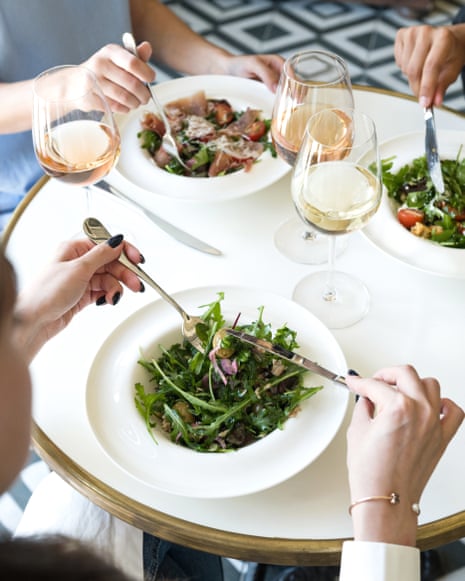From theguardian.com
Whites – especially amber-tinted ones – and even cider are a superb match for a diet that’s heavy on the greens, root veg, hearty pulses and plant-based stews
The topic of wine with vegan food normally focuses on whether or not the producer has used animal-based products such as isinglass (or fish bladder), egg white (both of which are increasingly rare these days) or milk protein (much more common) in the fining process. But, given the popularity of vegan food, most supermarkets have now abandoned even the last of these, enabling them to claim, quite accurately, that most of their wines are suitable for vegans.
However, if you’re vegan, or have just decided to eat vegan this month, that’s not totally the point, is it? Veganism usually stems from a concern about the provenance of your food and a desire to have it as naturally produced as possible. And most commercial winemaking, as in other large-scale commercial food production, uses a battery of additives to achieve an acceptable result at an affordable price, which is why most vegans, I think, would prefer to drink wines that have had minimal intervention – in other words, natural (though that is in itself a controversial term).
There’s also the issue of what you’re likely to be eating with that wine. Unless it’s designed to mimic meat, plant-based meals point more to white wines than to reds, but at this chilly time of year, not least when so many of us have the heating turned down, that may well be the last thing you fancy.
The ideal answer, I think, is orange or amber wine – that is, a wine made from white grapes for which the juice is left in contact with the skins in much the same way as when making a red. This not only leaves the wine with a more pronounced colour, which can range from pale gold to deep orange, depending on the extent of the maceration, but also with a more tannic structure that can stand up to robust food. Think aubergines, mushrooms, roast celeriac and cauliflower, dark, leafy greens such as sprout tops and kale, nuts (especially walnuts), pulses and tahini.
Aromatic grape varieties such as malvasia, solaris and pinot gris are particularly lovely with any of those. The downside is that they’re often not cheap, though if January is about restraint, rather than denial, you could make a bottle last for two to three days, especially if you regard it as a weekend treat.
There is a cheaper alternative, though – cider – and it could keep you going for the rest of the week, too. I’m not sure cider-makers would be flattered to be regarded as second best to natural wine, though the products can be similar, but apples really do have an affinity with many vegetables, especially root veg and greens. And if you’re not drinking booze this January, why not make it apple juice, such as the absolutely gorgeous Falstaff juice in today’s pick, which would count as at least one of of the 30 plants we’re now supposed to try to consume each week, according to Professor Tim Spector of Zoe.
 ‘Plant-based meals point more to white wines than to reds.’ Photograph: Artur Kozlov/Getty Images
‘Plant-based meals point more to white wines than to reds.’ Photograph: Artur Kozlov/Getty ImagesFive great matches for plant-based food
Lyrarakis Gerodeti Melissaki 2021 £16.55 Field & Fawcett, £17 Corks of Bristol, £18.49 (or £17.57 if you buy six) Cambridge Wine Merchants, 13.5%. A Cretan cocktail of fruit flavours (quince, pear, papaya), but dry and firmly tannic. Try with a whole roast celeriac (melissaki is the grape variety).
Denbies Orange Solaris 2021 £25 denbies.co.uk, 12%. Even English producers make orange wine these days. Lovely peach and apricot fruit, with a touch of orange blossom.
Iford Wild Session Fresh Juice Cider, £18 (for 6 x 440ml cans) ifordcider.com, 4.7%. Soft, gentle, medium-dry cider – as the name suggests, sessionable.
Townsend Farm Falstaff Apple Juice, £4.25 (75cl, or £20 for six ) New Market Dairy Altrincham. Beautifully fresh, tart apple juice that would go well with a crunchy cabbage or fennel salad.
Portela do Vento Daterra Viticultores 2020 £26 hectorslondon.co.uk, £26.50 Native Vine, Bristol £27 Chester’s of Abergavenny, 12.5%. Sumptuously rich amber wine from Galicia, made from godello, that I came across at Picole, a new natural wine bar in Bristol. Just glorious, but there’s not much of it around, so snap it up if you find a bottle.
https://www.theguardian.com/food/2023/jan/06/the-best-wines-for-vegan-food-fiona-beckett
No comments:
Post a Comment